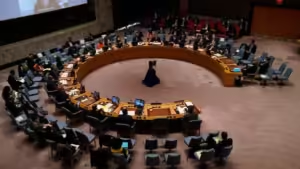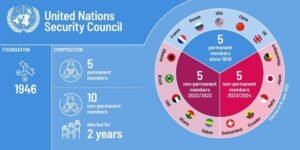UNSC (United Nations Security Council) is set to elect new non-permanent members, on June 6, including Panama, Greece, Denmark, Pakistan, and Somalia. Their terms will kick in in 2025 and last for two years.
The five council members chosen on Thursday will take office on January 1st, taking the place of Mozambique, Japan, Ecuador, Malta, and Switzerland, whose two-year tenure expire on December 31st.

The five new members elected this year will take up their seats on Jan 1, 2025 and will serve until Dec 31, 2026.
They will join the five veto-wielding permanent members – the United States, Russia, China, United Kingdom and France.
The five nations that will be elected to two-year mandates on the council by the 193-member world organization will be decided by vote. Among the fifteen members of the council, ten non-permanent seats are given to regional organizations, who normally choose their own candidates but occasionally cannot agree on one.
In the race for the regional group representing East Europe’s seat last year, Slovenia decisively defeated Belarus, Russia’s close ally, reflecting the strong international resistance to Russia’s full-scale invasion of Ukraine.
This time, Somalia was proposed by the regional groups for the African seat, Pakistan for the Asia-Pacific seat, Panama for the Latin American and Caribbean seat, and Denmark and Greece for the two seats that are primarily Western.
Pakistan, representing the Asia-Pacific group alongside India, stands as a strong contender for one of the available seats. The elections are exclusive to the 10 non-permanent positions, as the UNSC’s five permanent members — Britain, China, France, Russia, and the United States — do not undergo the electoral process.

All five candidates have served on the UNSC previously: Pakistan seven times, Panama five times, Denmark four times, Greece twice, and Somalia once.
Almost all nations concur that the Security Council should enlarge and reflect the globe of the twenty-first century, not just the post-globe War II era, over eight decades after the UN was founded.
The main point of contention among the 193 nations with national interests, however, is precisely how. And for forty years, those differences have prevented any meaningful reform of the most powerful body in the United Nations.
Pakistan and Somalia — both members of the Organization of Islamic Cooperation — voted in Favour of both resolutions and have criticized Israel’s conduct of the war. On May 10, all five candidate countries voted in Favour of the UNGA resolution granting new “rights and privileges” to the State of Palestine and calling on the Security Council to reconsider the Palestinian request to become a UN member state.
While non-permanent members lack veto power, their active participation is crucial for maintaining global peace and security.
How are non-permanent members of UNSC are elected?
The General Assembly chooses the two-year tenure for non-permanent members of the UN Security Council. Candidates run campaigns to garner the necessary number of votes, and the election process incorporates regional representation. With a certain number of seats allotted to each region, the composition is guaranteed to be balanced and diverse.
Traditionally, the allocation of the non-permanent seats follows a rotational method among regional groups. Consensus within these groups often determines the selected candidate.
How many non-permanent members are there?
The United Nations Security Council currently has ten non-permanent members. These members serve two-year terms and actively participate in decision-making, voting on resolutions, and representing different regions of the world.
Permanant members of UNSC
China, France, the United States, the United Kingdom, and Russia. These countries were allies during the Second World War and are nuclear capable. Any of the five permanent members can veto a resolution to prevent its adoption by the council regardless of the level of support.

The G-4 countries – Brazil, Germany, India, and Japan – have been supporting each other for the permanent seats on the UNSC.
UNSC reforms refer to changes that have been proposed to the structure and functions of the Security Council to improve its effectiveness and efficiency in maintaining international peace and security.
Some of the proposed reforms include expanding the number of permanent members, establishing a new veto system, and giving more power to the General Assembly. However, these reforms are highly controversial and have faced opposition from some of the current permanent members of the Security Council.










